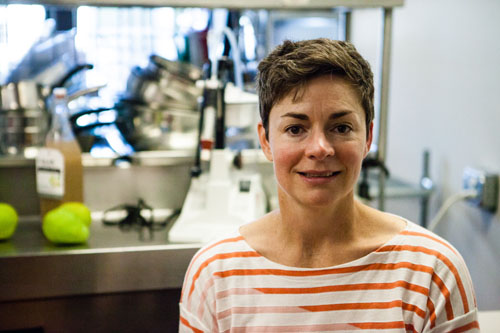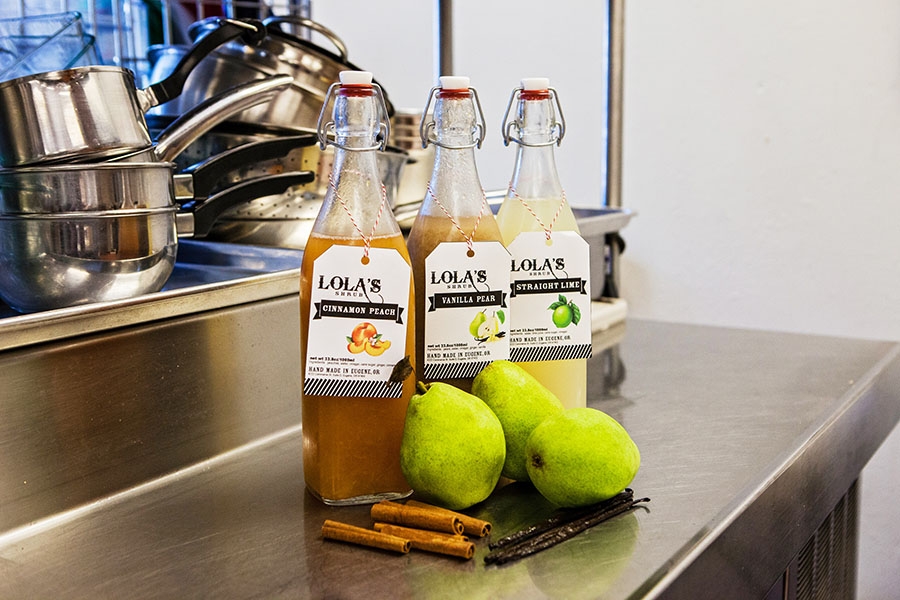Molly Rogers believes she has found the solution to excessively syrupy cocktail mixes. She first just needs people to understand her product isn’t foliage.
Company: Lola’s Fruit Shrubs
Founder: Molly Rogers
Launch: 2013
Headquarters: Eugene
Molly Rogers believes she has found the solution to excessively syrupy cocktail mixes. She first just needs people to understand her product isn’t foliage.
The founder of Lola’s Fruit Shrubs, a fruit juice made by pressing fruit and then preserving it in vinegar and sugar, Rogers hopes to carve out a niche in the cocktail-mixer market by offering consumers a light, all-natural alternative.
A shrub base is superior to fresh juice, Rogers says, because the vinegar prevents it from spoiling. Plus, her version is made with no concentrates or artificial materials. As consumers become increasingly enamored with craft distilleries — in 1990 there were seven in the U.S., by 2018 there will be an estimated 1,000 — Rogers expects a holistic approach to reign supreme.
“People who take the time and spend the money on these high-end, very well-made spirits — there’s nothing on the shelf that they can buy to mix those drinks with to make a really great cocktail,” she says.

The inspiration for the company is Rogers’ great-grandmother, Lola, who preserved peaches for a shrub she remembers spreading over her ice cream as a child. Trained as an engineer, Rogers started experimenting with limes and vinegar. Trial and error yielded a “compelling” recipe, which she tested out at the Springfield Farmers’ Market.
After expanding into the Lane County Farmers’ Market, Rogers decided to explore selling wholesale, which requires FDA approval. The process took 15 months and thousands of dollars (from her savings), delaying entry into the market. The FDA stamp offers a huge competitive advantage, she says, but the cost “is a huge barrier for smaller companies.”
Rogers recently applied and was accepted into the RAIN Eugene accelerator program. She is working on a store-ready label and is in discussions with local grocers for shelf space. She is also leveraging her thriving business at the Eugene-area farmers’ markets (she estimates she sells out a stock of 80 to 90 bottles at $13 apiece each Saturday) to solicit feedback on all manner of operations. “I test recipes, sugar content, price, you name it, because folks are so willing to give feedback,” Rogers says. “It’s a great way to interact and have everyone in the area become a part of the story of this business.”
How to: To make simple shrub, crush fruit, pack with sugar and vinegar and let it stand for 24 hours before straining. Rogers herself prefers a more nuanced approach: “I press fruit [that is strained out] and add juice back in. I do some herbal tweaks if I’m adding peppercorn or cinnamon. I take time after the concentrate is made to tweak and make it ready to drink, and build a recipe that’s more complex.”
Price conscious: Rogers graduated from Sprout!, a food-business incubator in Springfield, where she learned about the margins of selling retail. Accordingly, she sells her liter bottles at a price that won’t change after she adds a distributor and other associated costs of expansion. She also is cultivating relationships to limit her overhead: “I was a part of the Oregon Berry Festival in the last few years and have met a lot of growers there. I enjoy being in Eugene and the Willamette Valley, where there is just so much fruit.”
Spirits of Portland
Ten years after the craft distillery boom first hit Portland, some believe an industry contraction is inevitable. Others point to public and private sector developments that are helping sustain growth.
A few distilleries have secured investments to expand production. Eastside Distilling in Southeast Portland, for example, trades on the OTC Markets Group and wants to use that investment to expand into a 41,000-square-foot facility.
Distillery owners are also hoping federal and state governments pass legislation to decrease excise taxes, which are higher for distilleries than any other liquor producers. A House bill, H.R. 1172, would cut the national excise tax from $13.50 to $2.70 on each proof gallon produced. “Companies aren’t going to lower their prices [if it passes]; they’re going to invest in their business. To get some kind of relief would be huge for what we can produce,” says Ted Pappas of Big Bottom Whiskey in Hillsboro.
New distilleries find themselves at a crossroads; they can try to access midlevel production with investment dollars, or stay small, harnessing local grassroots energy. “I encourage a lot of people who want to get into distillation and are daunted by distribution to start a neighborhood distillery. That way you’d have a local clientele ready to keep you going,” says Lee Medoff of Bull Run Distilling Company.
But as Ryan Csanky warns, entrepreneurs should steer clear of segments that have too much competition. He started a vodka-making venture before reopening as Aria Portland Dry Gin. Whiskey could be going the way of vodka in terms of market saturation, he says. “You’re going to see resources become shorted and places start to shut down.”
The U.S. craft distilling industry has grown from $41 billion in 2005 to $93.45 billion in 2014. Whiskey sales have increased 30% in the past decade.
{jcomments on}



